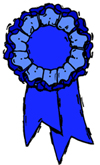BROWSE BY CATEGORY
- Archives and Libraries
- Blogs and Networking
- Bookmark This
- Digital Tools
- Examples of Teaching
- Exhibits
- Film Reviews
- History and Headlines
- Historic Sites and Museums
- Historical Thinking
- Holidays and Heritage
- Issues and Research
- Lesson Plans
- Material and Visual Culture
- Multimedia
- Organizations and Agencies
- Primary Sources
- Professional Development
- Publications
- Student Activities
- Teaching Materials
- Websites
Top Tens, or "Best Sites for..."

Lists of Top Ten Best Sites For... or 100 Best Whatevers or One Thousand Resources to Help You... abound on the internet.
But are lists of Bests valuable? They are one way to corral the quick fix, hyperlinked capability of internet research and to mediate enormous quantities of material of unknown quality. Then there's always the hope that other people's time spent compiling these lists might save us some of our own.
So, here's an eclectic selection of a few lists that have come to our attention. Since we don't want to marginalize other prime candidates, we won't call them the best of the bests, but they're definitely quite, quite good. And if all of them don't directly address history teaching, many do speak to pedagogical methods applicable to the history curriculum.
Educator Larry Ferlazzo is a prolific list creator (also featured in previous Clearinghouse blog posts). My Best Of Series is a table of contents to those lists that cover topics from A to W (Art to Web 2.0) with social studies, ESL and ELL, and a broad variety of content and methodological topics in between.
Making Teachers Nerdy is another teacher-based blog from a tech integration specialist who went back into the classroom when budget cuts affected technology teaching. This Kansas teacher blogged between January and September in 2009, annotating links and best of lists of tech tools appropriate to her curriculum. Attached comments from readers augment her blog entries.
Top Ten Sites for Brainstorming/Mind Mapping is from Technology Tidbits: Thoughts of a Cyber Hero the blog of technology education specialist Dav Kapuler. Kapular advocates mind mapping as "a tool that facilitates ideas and collaborative in nature," as an ideal tool for 21st century learners.
In October, 2009, the New York Times published The 10 best educational websites. Maybe yes. Maybe no. But these selections definitely link to some of the largest educational organizations that are crammed with information helpful to the American history curriculum and that serve as gateways to relevant microsites.
History News Network features Cliopatria's History Blogroll. This gateway places blogs within 30 categories such as American History, Primary Sources, Military History, Women's History—and each listing is well-populated with history content and commentary.
Kathy Schrock's Guide for Educators lists American History Sites, General History and Social Studies Sites, World and Ancient History Sites. These, too, are eclectic lists that may take you to historic sites, archives, lesson plans, and tech tools.
Ten Tips for Personalized Learning via Technology from Edutopia talks about how to use digital technology tools for teaching and assessment to help meet the challenge of increased classroom diversity. "Income levels, ethnicities, family structures, first languages, interests, and abilities now vary so much, that a traditional teaching approach, with a uniform lesson targeted to the average-level student, just doesn't cut it" is the premise of the list.
Resources specifically directed toward middle school teachers and students are often difficult to find, so here's a list of one.
Middle School Matrix: Exploring the changing world of middle school teaching and technology is a blog from a Philadelphia history, English, and technology educator . She talks about what she teaches, how she implements lesson plans, about how technology works (or doesn't work) with different units, and about the role and goals of the educator. The focus is the curriculum and the student; technology is a means to meet classroom goals.